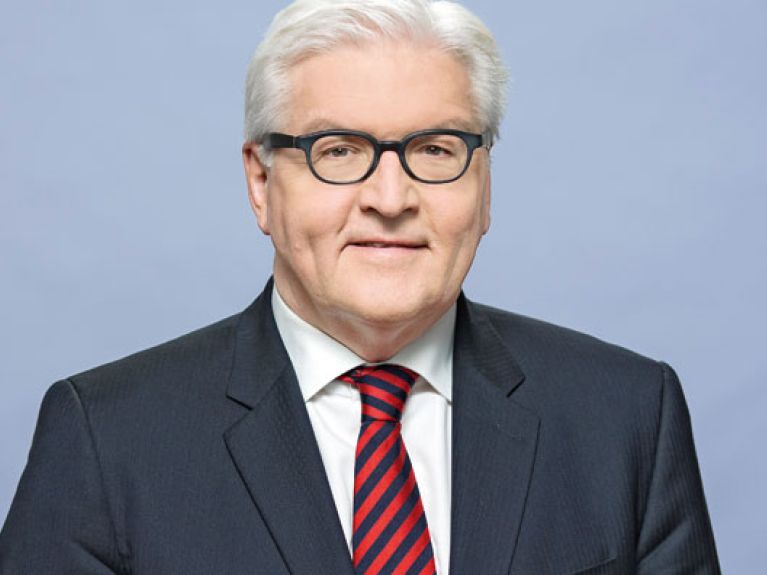Stronger than all divisions
We are looking back on several epoch-making events of the 20th century, major turning points in history.

A coincidence of the calendar makes 2014 a very special year of remembrance. We are therefore looking back on several epoch-making events of the 20th century, major turning points in history: not only the outbreak of the First World War in 1914, the “seminal catastrophe of the 20th century”, and the beginning of the Second World War with the “break with civilisation” committed by the Nazi regime, but also the fall of the Wall in 1989 that ended the Cold War era. The latter led to the reunification of Europe and the eastern enlargement of the European Union in 2004 – another milestone we are also commemorating today.
All these events have left deep scars in Europe. The question is: What can we learn from them in order to shape the future in peace and with optimism? What that means in this year of remembrance 2014 is that we must take another very close look at each of these events.
The beginning of the war 100 years ago, the collapse of the fragile European balance of power in summer 1914, is an onerous story about the failure of elites, the military and diplomacy. The old thought patterns of the Congress of Vienna were no match for the highly complex, interdependent, already almost globalised Europe of the early 20th century. It should have been the responsibility of diplomacy to deliberate and seek dialogue, to soberly consider alternatives and sound out compromises. However, there was not only a lack of instruments for that, but also the will.
In the German collective memory the horrors of the First World War were later superimposed by the Second World War and the crimes against humanity of the Shoah. Fewer and fewer historical witnesses are able to help us keep alive the memory of this darkest period in German history. That also represents a turning point, and it must therefore remain our duty in the future not to give in to the all too human desire to forget or relativise the past. For only those who know the demons of history can banish them.
When we remember the two world wars this year, we are not doing so from a comfortable armchair, but from the roller coaster of a rapidly changing world. We have the great good fortune that war in Europe has become (almost) inconceivable. Nevertheless, we find ourselves confronted by enormous challenges. On one hand, there is the situation in Ukraine, where we face what must be the most difficult foreign policy crisis in Europe since the end of the Second World War. On the other, we are observing a strong loss of trust in the European project among sections of the European population – especially among young people, for whom Europe no longer automatically represents future opportunities and the promise of better times.
Many people have come to take for granted the value of a stable peace order in which the strength of rights prevails rather than the right of the strong and in which no Iron Curtain hinders crossborder contact or the movement of goods. In this year of remembrance, however, we can see that this should not be taken for granted at all.
Twenty-five years ago, in Germany we overcame a division that was a terrible consequence of the Second World War, a conflict that was begun by Germany. Many of the people who passionately worked for the end of the bloc confrontation were driven by the desire for new opportunities and prospects. These included economic prosperity – but above all people wanted to live in freedom, peace and security. Values such as democracy and the rule of law, freedom of opinion and the press, cultural and religious diversity held unbroken appeal then as now. This appeal was stronger than all the divisions. We then took another step along this path with the eastern enlargement of the EU ten years ago. People in the acceding countries boldly transformed their political system, their economy and their everyday lives in the spirit of European values. The division of the continent into East and West was overcome. Today in all of Europe we can learn from these experiences.
The past can thus be a point of reference – but it must not entrap our thoughts and actions. Just as the old thinking of the Congress of Vienna failed during the crisis 100 years ago, we must not stand still and only look backwards. We must make intelligent use of our experience to find new solutions for today’s problems. Remembrance is our incentive not to repeat the mistakes of the past and to use all the instruments available to preserve peace and freedom. Equally, the memory of the overwhelming joy with which people in Germany and Europe embraced one another again after decades of division provides hope that apparently insurmountable conflicts can be transformed by determination and courage.
It is a great achievement that today in Europe we spend nights arguing about solutions and compromises instead of fighting over centimetres of land on the frontline. Seeking understanding wherever it is possible must remain the duty of our foreign policy and diplomacy. That is what the year of remembrance 2014 ensures we do not forget. ■
Dr. Frank-Walter Steinmeier
Federal Foreign Minister